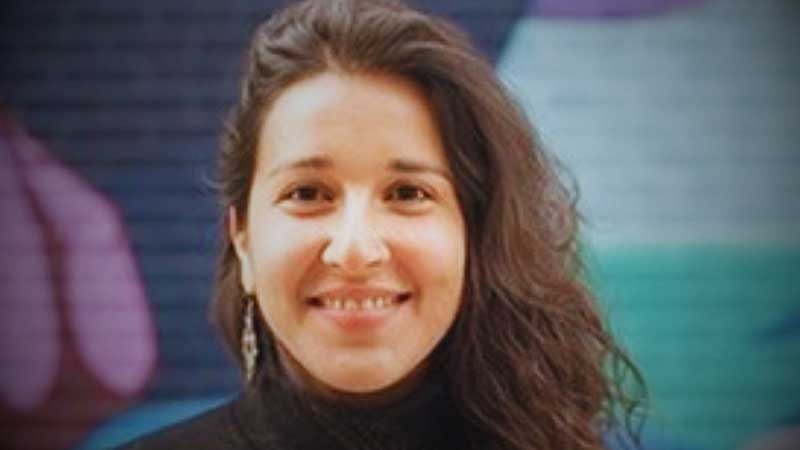Climate School Program for High School Students Will Explore Climate Complexity in Chile and Argentina
Leading the trip will be Chilean alumna Antonia Samur (SIPA’18), from the National Center for Disaster Preparedness.

Argentina, Bolivia and Chile are known as the “lithium triangle,” holding more than half of the world’s reserves a mineral that is key in the manufacturing of batteries and which plays an important role in the energy transition and climate solutions, while also presenting an economic boon for these countries.
A new program developed by the Columbia Climate School will help motivated high-school students understand the environmental challenges and solutions of the lithium industry through field learning experiences in Chile and Argentina. The Columbia Climate Corps Chile & Argentina Program will debut this northern summer, and will be coordinated by Chilean alumna Antonia Samur (SIPA’18) and associate at Columbia’s National Center for Disaster Preparedness.
The trip is a three-week journey (between July 22 and August 11) that focuses on climate impacts and risk. Beginning in Chile’s capital, Santiago, students will hear from expert in sustainable management of mineral resources, Nicolas Maennling, who is also the principal advisor for the Andean Region at the German Agency for International Cooperation (GIZ) and a researcher at Columbia’s Center for Sustainable Investment (CCSI). Following Santiago, the group will visit the Hydrographic and Oceanographic Service of the Chilean Navy (SHOA) in Valparaíso, where they will learn about climate disaster risk reduction strategies.
Students will then head north to visit de Atacama Desert, where they will immerse in the history of mining in the region, learn about the impacts of desertification and water management challenges for local communities, and discuss issues of human rights and gender equality in the mining sector.
Students will then enter the Argentinian Andes and meet with small communities to learn how climate change is impacting their regions. They will hike across unique geological formations and explore the biodiversity of Calilegua National Park, in the province of Jujuy, where they will learn about conservation of wild lands and ecological zones. The trip will end in the province of Salta, where students will conclude their final projects.
Q&A WITH ANTONIA SAMUR
What will you teach at Columbia Climate Corps Chile & Argentina Program?
I will be teaching about the challenges of climate change and other disaster hazards in Chile. I will focus on the social and political dimensions of climate change, disaster impacts, and coping/adaptation capacities, as well as disaster management systems in Chile and how disaster management policy has evolved in the last few decades in response to disaster events.
Why is it important engaging high school students with climate change challenges and solutions?
We need the younger generations to take an interest in innovative solutions to mitigate and adapt to climate change, as well as to understand its complexities as climate change interacts with all other global challenges. These challenges are multidisciplinary and will require future generations of college graduates to think about their lives and careers in much more holistic ways than previous generations. We need creative and flexible minds that can be optimistic enough to imagine a sustainable future and then build it. We need young professionals to help us think outside the box.
The most obvious fields students might think about when considering the issues of climate change are technology, engineering, advancing the physical sciences and research, etc. But equally important, if not more, is the socio-political transformations that humanity needs for equity and sustainable development. So, to me, opportunities like this trip are important because they will show in a very practical way some of these complexities to high school students, and hopefully will encourage an optimistic view of the power of collective action.
What do you hope both you and the students will gain from this program?
I think the experience of traveling to a different country itself will be enriching. From my own experience, traveling internationally when I was in high school opened my mind in so many ways, and it catalyzed a lot of personal growth. So, I hope the students fully take in the experience of being in a different environment and culture. I hope they challenge themselves to step away from their comfort zones and embrace making new friends and broadening their viewpoints and understanding of the world. Then, I hope they are encouraged to go home and find ways in which they can contribute to making the world a little better in whatever ways also fulfill them. I hope this trip will help them build a sense of purpose.
I hope to take this as an opportunity to learn from the students, their concerns, and their points of view about these issues. I haven’t taught much, so it will also be a learning opportunity for me to figure out effective methods of teaching these issues in a very practical, applied, and down-to-earth way.
What do you think will be the most influential component of the program?
I think it will be the combination of being in a place with a lot of challenges related to climate change and disasters, while also being encouraged to think about how they can be proactive and purposeful in thinking about solutions and their own role in the world. I hope it can be a very inspirational experience.
Read the full version of this article here.
Learn more about the Climate Corps Chile-Argentina program here.